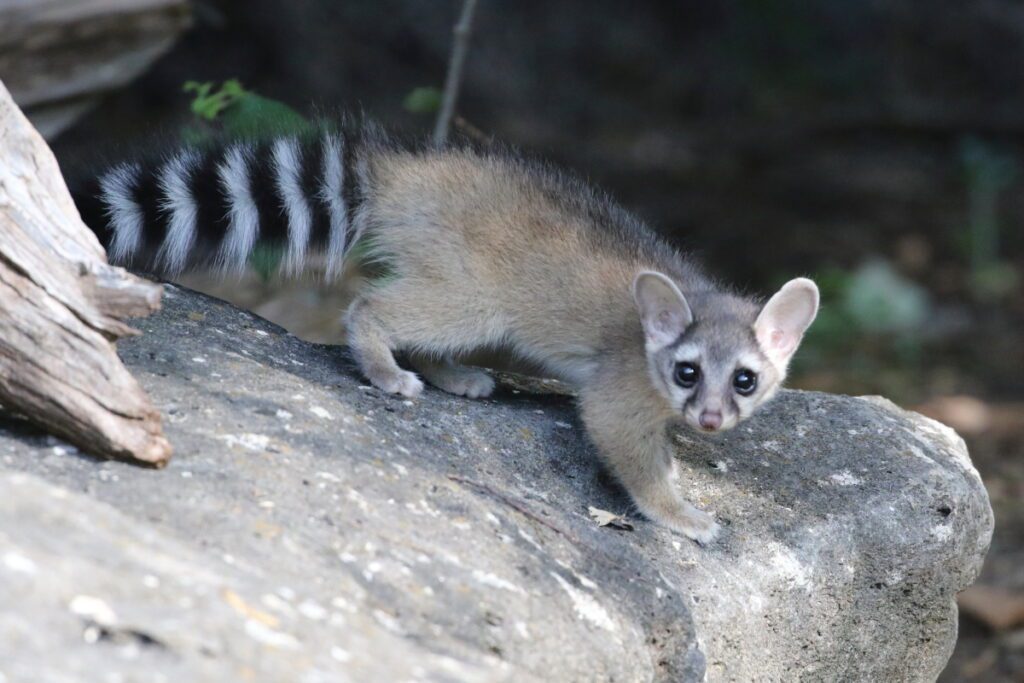The Ring-Tailed Cat (Bassariscus astutus), also known as the Ringtail, is a captivating nocturnal mammal known for its strikingly bushy tail adorned with alternating black and white bands. Visit our Nighttime Natives exhibit to observe these elusive and charming creatures up close. Let’s discover more about their diet, habitat, size, and conservation status, as well as some intriguing facts that make the Ring-Tailed Cat a true marvel of the animal kingdom.

Diet
Ring-Tailed Cats are omnivorous, with a diet that consists of a diverse range of foods. They primarily feed on insects, small mammals, and birds, but also consume fruits, berries, and vegetation depending on the season and availability. Their adaptability and diverse diet enable them to thrive in a variety of habitats.
Habitat
Ring-Tailed Cats inhabit a wide range of environments, including arid deserts, rocky canyons, and forested areas throughout the southwestern United States, Mexico, and Central America. They are highly adaptable creatures and can also be found in scrublands and pinyon-juniper woodlands. These agile climbers prefer habitats with plenty of trees, rocks, and crevices to take shelter in and use their climbing skills to navigate the terrain.
Size and Weight
Ring-Tailed Cats are small, slender mammals, with a body length typically ranging from 12 to 16 inches (30 to 40 cm) and a tail length of 12 to 17 inches (30 to 43 cm). They generally weigh between 1.5 to 3.3 pounds (0.7 to 1.5 kg). Their long, bushy tail is used for balance and communication, and its striking band pattern serves as camouflage in their natural environment.
Conservation Status
The Ring-Tailed Cat is currently listed as “Least Concern” on the International Union for Conservation of Nature (IUCN) Red List. Their population is considered stable across most of their range. However, they may face local threats such as habitat loss, human encroachment, and predation by domestic animals.
Intriguing Facts
Nocturnal Nature:
Ring-Tailed Cats are primarily nocturnal, becoming active at dusk and spending the night foraging for food. During the day, they take refuge in trees, rock crevices, or abandoned burrows to rest and avoid predators.
Agile Climbers:
Ring-Tailed Cats are expert climbers, using their sharp claws and long, banded tails for balance and agility. They can navigate vertical surfaces, climb trees with ease, and even descend headfirst like squirrels.
Social Grooming:
Ring-Tailed Cats engage in social grooming, with individuals often grooming each other's head and neck areas. This behavior helps to strengthen social bonds and maintain a healthy coat.
Solitary Lifestyle:
Although they may engage in social grooming, Ring-Tailed Cats are generally solitary animals. They maintain separate territories, coming together only to mate or engage in brief social interactions.
State Mammal:
The Ring-Tailed Cat is the state mammal of Arizona, highlighting the significance of this unique and captivating creature in the region's wildlife.
Visit the Ring-Tailed Cat at the Abilene Zoo
During your visit to the Abilene Zoo, be sure to stop by our Nocturnal exhibit of Elm Creek Backyard to observe the enchanting Ring-Tailed Cat. As you learn about their unique adaptations, diverse diet, and remarkable climbing abilities, you’ll develop a newfound appreciation for these elusive and charismatic mammals.
FAQ
Are ring-tailed cats dangerous?
Ring-tailed cats are not dangerous but they pose a health risk to you and your pets. Their fecal matter can spread various bacterial and viral infections. They can also infect you and your pets with rabies.
Are ring-tailed cats found in florida?
No. Ring-tailed cats are not found in Florida as they tend to like dry climates. They’re native to the southwestern United States and can also be found in Mexico and Central America.
Are there ring-tailed cats in texas?
Yes. Ring-tailed cats are in Texas and are more common in Central and West Texas.